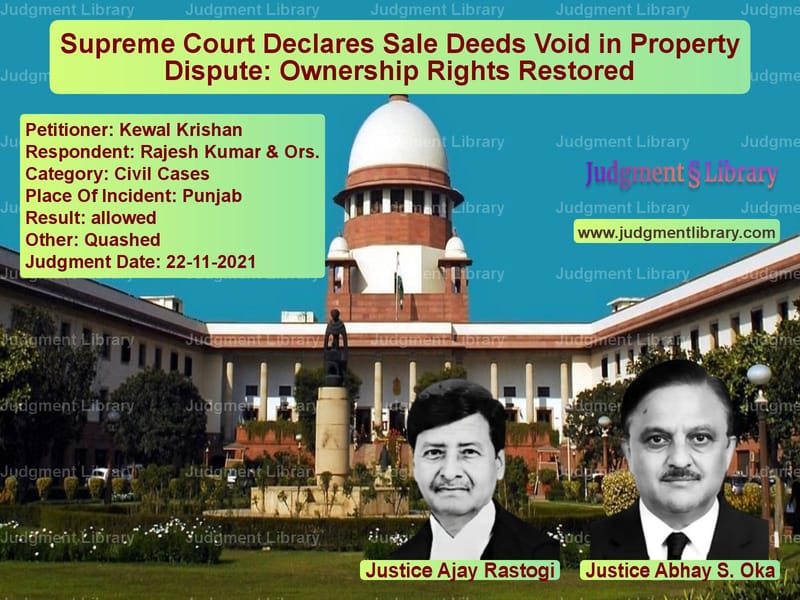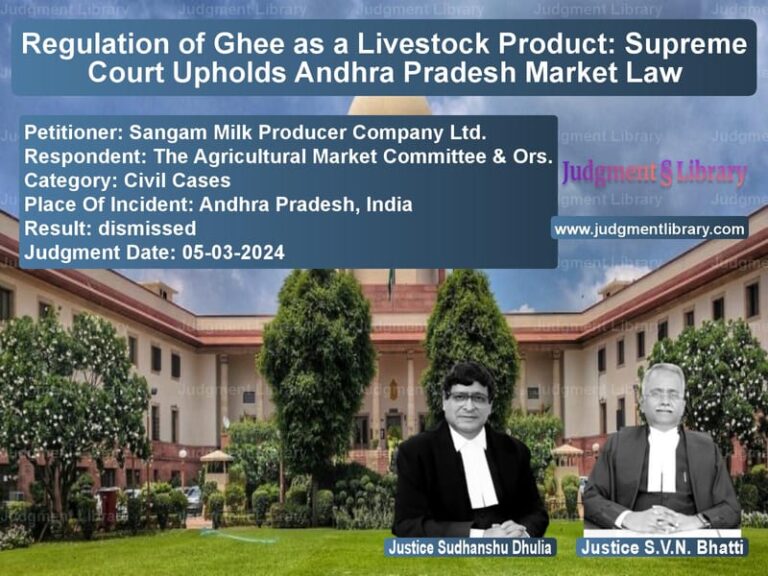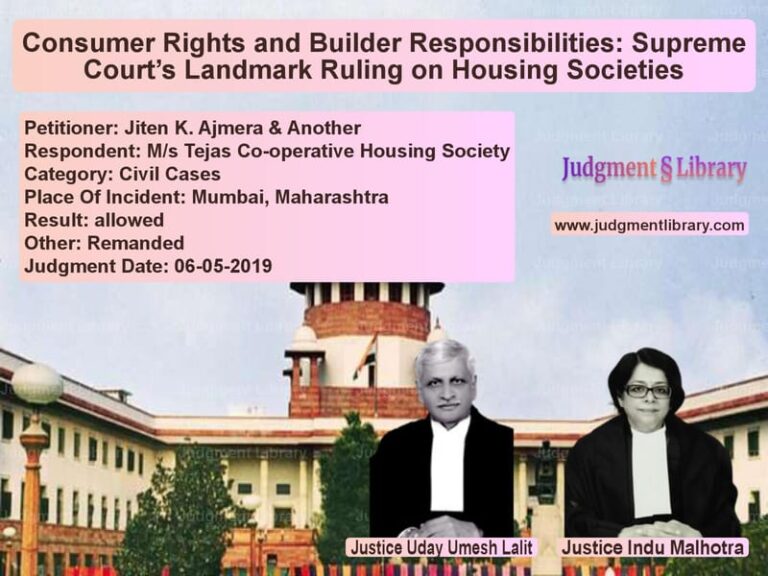Supreme Court Declares Sale Deeds Void in Property Dispute: Ownership Rights Restored
The Supreme Court of India, in its judgment dated 22 November 2021, ruled in favor of Kewal Krishan, setting aside the sale deeds executed by his brother, Sudarshan Kumar, and restoring his ownership rights in the disputed properties. The case, Kewal Krishan vs. Rajesh Kumar & Ors., centered around the validity of sale deeds executed using a power of attorney and the rights of co-owners in jointly acquired property.
Background of the Case
The legal dispute involved properties jointly purchased by Kewal Krishan and his elder brother, Sudarshan Kumar, through sale deeds dated 12 August 1976 and 19 October 1976. However, Sudarshan Kumar, acting under a power of attorney granted by Kewal Krishan, executed two sale deeds on 10 April 1981, transferring the properties to his minor sons and wife.
Feeling aggrieved by this unauthorized transaction, Kewal Krishan filed two separate civil suits on 10 May 1983, seeking an injunction against the respondents from interfering with his possession of the properties. The suits were later amended to include a prayer for a declaration that the power of attorney and sale deeds were null and void, along with a claim for compensation from the proceeds of a tube well installed on the properties.
Read also: https://judgmentlibrary.com/land-ownership-dispute-supreme-court-overrules-lower-court-decisions/
Petitioner’s Arguments
The petitioner, Kewal Krishan, represented by senior counsel, argued:
- The sale deeds executed on 10 April 1981 were without consideration and were, therefore, legally void.
- The properties were jointly acquired by both brothers, and Sudarshan Kumar had no exclusive ownership rights.
- The respondents, being the minor sons and wife of Sudarshan Kumar, had no independent source of income to purchase the properties.
- The High Court erred in holding that the sale consideration was not exorbitant, as there was no evidence proving that the purchasers paid the amount stated in the sale deeds.
Respondent’s Arguments
The respondents, represented by senior counsel, countered these claims by asserting:
- The properties were purchased solely by Sudarshan Kumar using his own funds earned while working abroad.
- Kewal Krishan was merely a benamidar (nominal owner) in the property transactions.
- Kewal Krishan had acknowledged Sudarshan Kumar’s sole ownership through a letter dated 5 April 1980 and voluntarily executed the power of attorney.
- The suits were barred by limitation as the petitioner had waited until 1985 to challenge the sale deeds.
Supreme Court’s Observations
The Supreme Court bench, comprising Ajay Rastogi and Abhay S. Oka, carefully analyzed the evidence and prior rulings. The Court noted:
- The respondents failed to produce any evidence proving that Sudarshan Kumar had paid the entire purchase consideration for the properties.
- There was no proof that the minor sons and wife of Sudarshan Kumar had any independent source of income to buy the properties.
- The power of attorney was used to execute self-serving transactions, rendering the sale deeds legally questionable.
- The High Court’s reasoning that the sale consideration was not excessive was flawed, as no payments were proven.
- The plea of limitation was inapplicable, as Kewal Krishan had consistently contested the sale deeds and had not acquiesced to them.
Key Supreme Court Rulings Cited
The Court relied on various legal precedents, including:
- Suraj Lamp & Industries Pvt. Ltd. v. State of Haryana (2012) – Clarifying that power of attorney sales are not valid conveyances of title.
- Hardev Singh v. Gurmail Singh (2007) – Stating that fraudulent transactions made by attorneys must be treated with caution.
- Ram Saran v. Smt. Ganga Devi (1973) – Affirming that co-owners cannot unilaterally transfer entire joint properties.
Final Judgment
The Supreme Court ruled in favor of Kewal Krishan and issued the following directives:
- The sale deeds dated 10 April 1981 were declared void and set aside.
- Kewal Krishan’s ownership rights in the properties were fully restored.
- The decree of joint possession passed by the District Court was reinstated.
- The respondents had no valid title over the properties, as the transactions were deemed sham and without consideration.
- The appeal was allowed, and the High Court’s ruling was reversed.
Implications of the Judgment
The Supreme Court’s ruling has significant implications for property disputes in India:
- Protection Against Power of Attorney Abuse: The judgment reiterates that power of attorney holders cannot misuse their authority to execute fraudulent transactions.
- Requirement of Consideration in Sale Deeds: The ruling reinforces that sale deeds without actual payment of consideration are legally void.
- Safeguarding Co-Owners’ Rights: Co-owners cannot be unilaterally deprived of their rights through fraudulent transfers.
- Clarification on Limitation in Property Disputes: Challenges to void transactions are not necessarily time-barred, especially when contested consistently.
The judgment in Kewal Krishan vs. Rajesh Kumar & Ors. upholds fundamental property rights and ensures that ownership cannot be manipulated through misuse of legal instruments.
Petitioner Name: Kewal Krishan.Respondent Name: Rajesh Kumar & Ors..Judgment By: Justice Ajay Rastogi, Justice Abhay S. Oka.Place Of Incident: Punjab.Judgment Date: 22-11-2021.
Don’t miss out on the full details! Download the complete judgment in PDF format below and gain valuable insights instantly!
Download Judgment: kewal-krishan-vs-rajesh-kumar-&-ors.-supreme-court-of-india-judgment-dated-22-11-2021.pdf
Directly Download Judgment: Directly download this Judgment
See all petitions in Property Disputes
See all petitions in Specific Performance
See all petitions in Judgment by Ajay Rastogi
See all petitions in Judgment by Abhay S. Oka
See all petitions in allowed
See all petitions in Quashed
See all petitions in supreme court of India judgments November 2021
See all petitions in 2021 judgments
See all posts in Civil Cases Category
See all allowed petitions in Civil Cases Category
See all Dismissed petitions in Civil Cases Category
See all partially allowed petitions in Civil Cases Category







